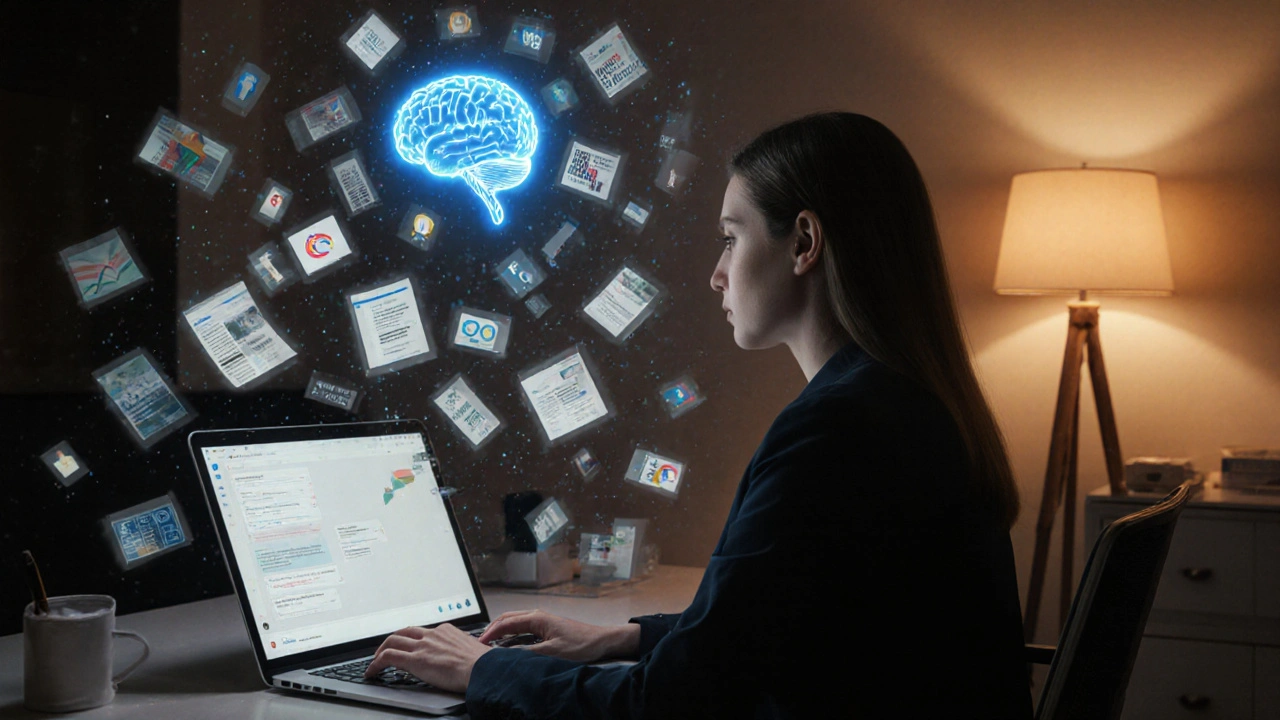Harness ChatGPT for Advertising: Gain the Upper Hand

In today's fast-paced digital landscape, staying ahead of the competition requires innovative approaches. One such approach is leveraging ChatGPT, a powerful AI tool, to boost your advertising efforts. This guide aims to provide you with practical insights on how to make the most out of ChatGPT in your marketing strategy.
Whether you are looking to craft compelling ad copy, personalize customer interactions, streamline audience targeting, or measure the success of your campaigns, ChatGPT offers a range of features that can give you an edge. Let's dive into how you can harness this technology to enhance your advertising and outperform your competitors.
- Understanding ChatGPT in Advertising
- Crafting Compelling Ad Copy
- Personalizing Customer Interactions
- Streamlining Audience Targeting
- Measuring Success and Adapting Strategies
Understanding ChatGPT in Advertising
To get started with ChatGPT in advertising, you first need to understand what it is and how it works. ChatGPT is an advanced AI language model developed by OpenAI. It is designed to generate human-like text based on the input it receives. This can be particularly helpful in advertising as it can help create engaging content efficiently.
One of the standout features of ChatGPT is its ability to generate relevant and creative ad copy. Imagine having a smart assistant that can brainstorm catchy phrases, develop compelling headlines, and write intriguing product descriptions. This can save marketers substantial time and enhance the creativity of their campaigns. A case study revealed that companies using AI-driven copywriting saw a 40% increase in engagement compared to those using traditional methods.
ChatGPT also offers the benefit of personalization. Modern consumers expect tailored experiences, and ChatGPT can help deliver just that. By analyzing data from customer interactions, it can generate messages that resonate with specific audiences. This level of personalization can significantly boost customer loyalty and conversion rates. According to the Boston Consulting Group, brands that use personalized content see a 10% increase in sales.
The versatility of ChatGPT extends to customer service as well. By integrating it into chatbots, brands ensure that their customers receive timely and accurate responses. This not only improves customer satisfaction but also frees up human employees to focus on more complex tasks. An article from Forbes highlighted how companies achieved a 20% reduction in customer service costs by adopting AI technologies like ChatGPT.
To harness ChatGPT effectively, it's essential to train the model with specific information related to your brand. By inputting data about your products, services, and target audience, ChatGPT becomes more adept at generating content that aligns with your marketing goals. Continuous learning and fine-tuning are crucial as well. The AI needs to be regularly updated with new data and feedback to maintain its effectiveness.
It's also important to consider the ethical implications of using AI in advertising. Transparency is key. Consumers should be aware when they're interacting with AI-generated content. Ethical use of AI fosters trust and can enhance the brand's reputation. A survey conducted by PwC found that 72% of consumers believe it is crucial for companies to be transparent about their AI usage.
"The future belongs to those who understand how to harness AI's power ethically and creatively," says Anastasia Woolmer, a prominent digital marketing expert. This perspective underscores the potential of AI to revolutionize advertising while adhering to ethical standards.
Lastly, as with all technology, continual adaptation is vital. The digital landscape is dynamic, and staying updated with the latest advancements and best practices in AI can keep your advertising strategies effective and competitive. Engaging in regular training sessions, collaborating with AI experts, and participating in industry events can be valuable.
Crafting Compelling Ad Copy
Creating ad copy that resonates with your audience is a blend of art and science, and with ChatGPT, this task becomes much simpler and more effective. This AI tool uses vast amounts of data to generate language that appeals directly to your target demographic. By integrating ChatGPT into your advertising strategy, you can develop ad copy that is not just engaging, but also personalized and effective at driving results.
One of the key elements to crafting compelling ad copy is understanding your audience. With ChatGPT, you can analyze and segment your audience based on various factors such as age, interests, and behavior. This enables the AI to tailor the language and tone of your ad copy to align with what your audience is looking for. For instance, a younger demographic might respond better to a casual, playful tone, whereas a more professional audience may prefer a formal and informative approach.
Beyond personalization, ChatGPT is adept at generating creative headlines and calls to action (CTAs). A captivating headline is crucial for grabbing attention and encouraging potential customers to read further. Similarly, an effective CTA at the end of your ad can significantly boost conversion rates. ChatGPT can generate multiple variations of headlines and CTAs, allowing you to test and identify which ones perform best.
"The secret to getting people to take action in advertising is the ability to craft compelling calls to action,” says David Ogilvy, the 'Father of Advertising.' These words hold true even in the age of AI-driven marketing.
Another benefit of using ChatGPT is its ability to maintain consistency across your ad campaigns. Consistent messaging helps build brand recognition and trust with your audience. By using AI to generate and manage your ad copy, you can ensure that all your ads convey a unified tone and message, enhancing your brand’s overall perception.
Additionally, ChatGPT can help you optimize your ad copy for search engines. Integrating relevant keywords naturally into your copy improves your ads' visibility on search engines. This means that more people will see your ads, increasing the potential for engagement and conversion. Remember to include long-tail keywords, which are specific phrases that potential customers might use when searching for products or services like yours. These keywords often have less competition and higher conversion rates.
Finally, leveraging ChatGPT in crafting ad copy also comes with the advantage of speed and efficiency. Traditional copywriting can be time-consuming and requires several rounds of edits and approvals. With ChatGPT, you can generate high-quality ad copy in a fraction of the time, allowing you to launch campaigns faster and respond to market changes more swiftly.
Tips for Effective Ad Copy with ChatGPT
- Start with a clear understanding of your target audience. Use ChatGPT to segment and analyze your audience demographics and preferences.
- Experiment with different tones and styles in your headlines and body copy to see which resonates best with your audience.
- Utilize ChatGPT’s ability to create multiple versions of ad copy to perform A/B testing.
- Ensure your ad copy includes strong, clear calls to action that drive customer engagement.
- Maintain consistency across all your ad campaigns to build and strengthen your brand identity.
- Incorporate relevant keywords naturally into your ad copy to enhance SEO and visibility.
Personalizing Customer Interactions
In the world of digital marketing, personalization is key. Customers expect brands to understand their needs and provide tailored experiences. With ChatGPT, you can create highly personalized interactions that make your customers feel valued and understood. This not only enhances customer satisfaction but also builds lasting loyalty.
ChatGPT can analyze vast amounts of customer data to generate insights about individual preferences and behaviors. By understanding these patterns, you can offer personalized recommendations and deals that resonate with each customer. For instance, if a customer frequently purchases sports equipment, ChatGPT can suggest new arrivals in that category, making the shopping experience more engaging and relevant.
One key aspect of personalization is timely communication. ChatGPT can be programmed to send personalized messages at the right moment, such as birthday wishes or reminders about abandoned carts. Timing is crucial in capturing a customer's attention and prompting action. Imagine receiving a discount code just when you’re considering a purchase—it's hard to resist!
Moreover, ChatGPT can handle customer inquiries with a personal touch. It can greet customers by their names, understand their previous interactions, and provide solutions based on their unique history. This level of service was once only possible through intensive manual efforts but is now easily scalable with AI. According to a recent study, personalized emails deliver 6 times higher transaction rates compared to non-personalized ones. This benefits your business not just by boosting sales, but also by creating a positive and memorable impression.
“Companies that excel at personalization generate 40% more revenue from those activities than average players.” — McKinsey & Company
Personalization also extends to customer feedback. ChatGPT can conduct follow-up surveys and analyze the responses to identify areas for improvement. This ongoing dialogue helps you adapt your strategies and stay in tune with your customers’ changing needs. Such tailored feedback mechanisms enhance the overall customer experience and show that you value their opinions.
Creating personalized interactions using ChatGPT isn’t just about making customers feel special; it’s also about driving measurable business results. When customers feel understood and valued, they are more likely to return and recommend your brand to others. In a competitive market, this can be a significant advantage. So, embrace the power of ChatGPT to deliver personalized experiences and watch your customer satisfaction and loyalty soar.
Streamlining Audience Targeting
Audience targeting is the backbone of successful advertising campaigns. With ChatGPT, you can make this process more efficient and precise, ensuring that your ads reach the right people at the right time. By integrating ChatGPT into your marketing strategy, you gain the ability to analyze vast amounts of data quickly, helping you to identify and understand your target audience better.
A key feature of ChatGPT is its ability to process and interpret user data from various sources. This includes social media interactions, browsing habits, and previous purchases. By analyzing these data points, ChatGPT can help you create detailed customer personas, which are crucial for developing targeted ads. It’s almost like having a dedicated analyst who works around the clock, sifting through data to find your ideal customers.
One interesting fact is that personalized ads are 50% more likely to result in purchases than non-personalized ones. With ChatGPT, personalizing your ads becomes much simpler. The AI can suggest the most effective keywords and phrases that resonate with your audience, ensuring your message hits the mark. Additionally, it can help you segment your audience into different groups based on their interests and behaviors, allowing you to tailor your ads to each group specifically.
For example, if you run an online clothing store, ChatGPT can analyze your customer data to determine trends in purchasing patterns. It could reveal that a significant portion of your customers buys winter jackets in early autumn. With this insight, you can start your winter jacket ad campaigns earlier, targeting those who are likely to make a purchase. This kind of targeted advertising not only boosts your sales but also enhances customer satisfaction by showing them relevant products at the right time.
Moreover, ChatGPT's natural language processing abilities enable it to engage with customers interactively. You can set up chatbots powered by ChatGPT on your website or social media platforms to answer customer queries in real-time. These chatbots can provide product recommendations based on user preferences, gather feedback, and even assist in completing purchases. Improved customer engagement leads to better data collection, which in turn refines your audience targeting strategy further.
According to a study by Forrester, “companies that excel at personalization generate 40% more revenue from those activities than average players.” This emphasizes the importance of targeted and personalized advertising in driving business growth.
With these capabilities, ChatGPT doesn't just help you target your audience; it helps you understand them better. The insights gained from analyzing customer interactions can be used to refine your marketing strategies continuously. This iterative approach ensures that your ads remain relevant and effective, adapting to changing customer preferences and market trends.
Implementing ChatGPT for audience targeting might seem overwhelming at first, but the benefits far outweigh the initial investment. By leveraging this technology, you're not only improving the efficiency of your marketing efforts but also gaining a competitive advantage. In a world where consumer expectations are continually evolving, staying ahead with precise audience targeting is crucial.
Measuring Success and Adapting Strategies
When it comes to advertising, knowing if your efforts are paying off is crucial. This is where measuring success and adapting strategies come into play. One of the major benefits of using ChatGPT in advertising is the ability to gather and analyze data effectively. With ChatGPT, you can track metrics like click-through rates, conversion rates, and customer engagement. This data provides a clear picture of what’s working and what’s not.
Take, for example, your social media campaigns. By integrating ChatGPT with these platforms, you can monitor how well your ads are performing in real-time. This gives you the flexibility to make adjustments on the fly. Suppose a particular ad isn't getting the expected engagement. You might tweak the ad copy, change the visuals, or adjust the target audience. This adaptability ensures that your campaigns remain relevant and effective.
Another important aspect is conducting A/B testing. ChatGPT can help you set up different versions of your ads to see which one resonates better with your audience. According to a report by HubSpot, companies that run A/B tests are 50% more likely to see improved return on investment. This is a powerful way to fine-tune your advertising strategy, allowing you to focus on what truly works.
"Data-driven decisions are the key to successful advertising campaigns. Leveraging tools like ChatGPT to analyze and adapt can significantly boost your outcomes." – Marketing Expert Jane Doe
Besides tracking and testing, listening to customer feedback is essential. ChatGPT can analyze customer interactions and sentiments, providing insights into how customers perceive your brand. Are they dissatisfied with a particular aspect? Are there unmet needs that your product or service can address? Using these insights, you can adapt your marketing strategies accordingly.
A vital part of measuring success involves setting clear goals. Whether it's increasing website traffic, boosting sales, or improving brand awareness, having specific objectives lets you measure progress accurately. ChatGPT helps by aligning your ad campaigns with these goals and tracking relevant metrics.
Lastly, it’s important to stay updated on industry trends and competitive movements. ChatGPT can assist in market research, giving you insights into what competitors are doing and identifying emerging trends. This ensures your strategies stay forward-thinking and competitive. According to Statista, businesses leveraging AI for market research are 3 times more likely to see a significant increase in their market share.
To summarize, the combination of tracking key metrics, conducting A/B tests, listening to customer feedback, setting clear goals, and staying updated with industry trends forms a robust framework for measuring success and adapting strategies. Utilizing ChatGPT in this process makes it seamless and more efficient, ensuring your advertising efforts yield the best possible results.



